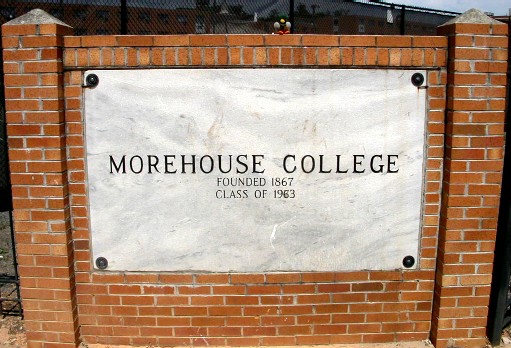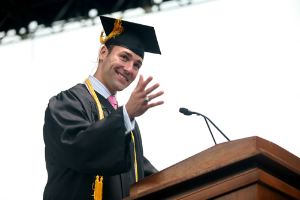The Lighter-Skinned Brother
March 4, 2010 • By Tiffani Knowles
Joshua Packwood, a boxed-about kid from the wrong side of the railroad tracks in Kansas City, Missouri, s eldom imagined that he would be the fruit of Martin Luther King, Jr.'s "I Have a Dream" speech.
eldom imagined that he would be the fruit of Martin Luther King, Jr.'s "I Have a Dream" speech.
 eldom imagined that he would be the fruit of Martin Luther King, Jr.'s "I Have a Dream" speech.
eldom imagined that he would be the fruit of Martin Luther King, Jr.'s "I Have a Dream" speech.The image of little black boys and black girls joining hands with little white boys and white girls as sisters and brothers seemed quixotic in 1963, and yet in a freer and what some call a "post-racial" 2010, Packwood holds fast to the words of King.
For four years, Packwood walked the halls once walked by King, the world's most notable Morehouse College alumnus. And, for four years, he felt at home at the all-male, historically black university, dealing very rarely with race-related tiffs.
In 2008, however, Packwood was named the first ever White valedictorian of Morehouse, which raked up controversy among Black activists who clinged to the charge that Morehouse was given more than 100 years ago: to provide the finest liberal arts education for African American men in the country.
"I don't believe in the color blind thesis. I believe that's sort of robbing us of a lot of the richness in our world," said Packwood, 23, who speaks in a polished baritone voice, disguising most of his down-home twang. "But, in many respects, my becoming valedictorian was a testament to merit being recognized. When Dr. King said that he wanted his children to be judged not by the color of their skin but by the content of their character, it meant that merit really stood…I had worked hard. I had done what was necessary to be valedictorian. And regardless of any controversy, or that a small population of the alumni was against it, the right thing would be done."
Packwood believes that his accomplishment was never about showing up Black men, but instead about "Morehouse holding its ground and demonstrating how far we've come in this country in regards to race relations," he said.
In fact, since he was a kid, Joshua was a poster child for race relations.
 Growing up in Kansas City, Packwood's father was disabled and had to be put in a convalescent home. His mother, who remarried a Black man, had very little resources to care for him and his siblings.
Growing up in Kansas City, Packwood's father was disabled and had to be put in a convalescent home. His mother, who remarried a Black man, had very little resources to care for him and his siblings.After certain domestic violence issues arose at home, Packwood bounced around to a lot of different milieus.
He lived with a Native American woman in a trailer park, he lived on a farm, he lived with a White upper class family who were lawyers, he lived in the inner city.
He finally settled down with a middle-class, blue collar Black family, The Joneses. His best friend, Tim, was the youngest brother in the Jones clan and they attended the same majority-Black high school.
"I don't consider family to just be biological," said Packwood. "It was the Joneses that got me into sports - football, basketball and track. They are just as much my family as my own blood."
When it came time to attend college, he was recruited to play football at a few different colleges and was even given a full-ride, need-based scholarship to attend the prestigious, ivy-league Columbia University.

Instead, he chose Morehouse, the 3,000-person, liberal arts college in Atlanta that produced not only King, but acclaimed filmmaker Spike Lee, Olympic gold medalist Edwin Moses and the several hundred, very successful men who were funded by Oprah Winfrey since she started her endowment to Morehouse in 1989.
"I knew I could get a quality education at either school. So, if that box was checked, then what was important was which school would provide me with a unique experience to view the world," said Packwood, who also got a full scholarship to Morehouse. "Employers want to know "do you provide a unique perspective of looking at problems?" and I wanted to be able to offer that."
Packwood recalls in class how people would joke about his Whiteness in completely good fashion and professors would ask for his perspectives on things like affirmative action.
"I knew going in, I was not just there to receive or take in this great, unique experience," said Packwood. "I was going to be expected to give my opinion, to contribute to the campus my set of experiences."
Still, Packwood admits he never did feel like "the other" at a school where most everyone possessed a darker hue than he.
 Not while he was dorm president or serving as Attorney General on Student Government Association, not while elected to Spelman College's homecoming court or dating some "fly" Spelman sisters, and not while mentoring Atlanta high school students or participating in the many rites of passage ceremonies that help Morehouse boys transition into Morehouse men.
Not while he was dorm president or serving as Attorney General on Student Government Association, not while elected to Spelman College's homecoming court or dating some "fly" Spelman sisters, and not while mentoring Atlanta high school students or participating in the many rites of passage ceremonies that help Morehouse boys transition into Morehouse men.And, he certainly didn't feel like an "other" on the day he delivered his valedictory speech.
"I'm guessing I could have used it to discuss much larger issues about society," said Packwood. "But, I saw it as a farewell speech on behalf of my peers. I wanted to convey what was the general experience we all shared as classmates and that's what I attempted to do."
Today, Packwood is living each day just as much a Morehouse man as his fellow Black alums. He is currently an investor with one of the largest investment firms in New York City.
He says he hopes to continue in investment as well as continue to make an impact on men - both Black and White - who aspire for greatness in the world. An impression was certainly left on his biological brother, John, who is now in his first year as a student at Morehouse College.
 In a few years, Packwood hopes to get his Ph.D in Philosophy and teach a new generation of students about how to both look at and look past race to experience the richness of the people who inhabit the world around us.
In a few years, Packwood hopes to get his Ph.D in Philosophy and teach a new generation of students about how to both look at and look past race to experience the richness of the people who inhabit the world around us.Stereotypes, notwithstanding, Packwood spent four years immersed in Black culture and says he still cannot offer a satisfactory definition of what a Black man is.
"From the outside, people would see a homogenous environment, but the one striking thing is that I still can't give you the definition of a Black man," said Packwood, who went to school with silver-spoon-in-the-mouth students, students from the projects and African and Caribbean national students. "So, it really forces you to re-evaluate those terms."
Related Articles · More Articles
The public charge rule that rendered immigrants inadmissible or ineligible for green cards if they accept government assistance was overturned in September and new rule, allowing immigrants to receive food stamps, healthcare services and other government aid, took effect December 23, 2022.
This Christmas, R&B singer-writer-producer Ne-Yo, stars in the BET+ original holiday remake of “The Sound of Music" directed by Booker Mattison.
Trump is like an aging boxer well past his prime, who does not know when to quit. Yet, which political stands in the wings? I think we all know.

